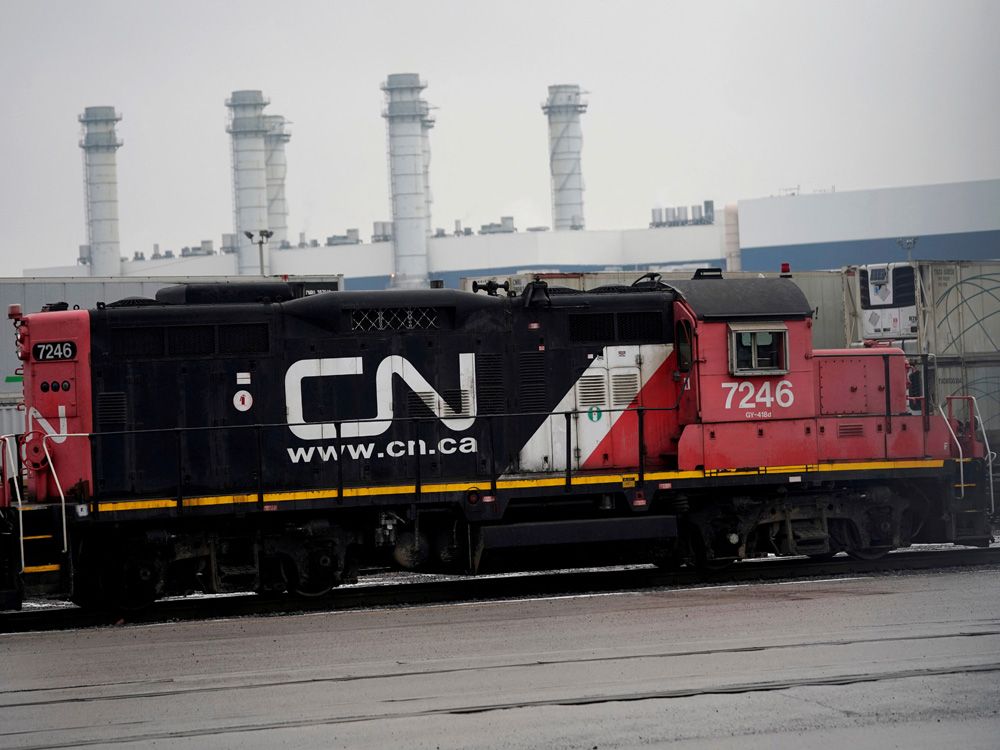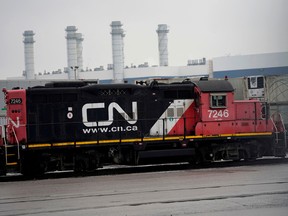CN, union spar over impact of strike on Canada’s largest railroad

The two sides are at odds over wages at a time of soaring inflation and record employment

Article content
Canadian National Railway Co. says an ongoing strike isn’t going cause delays or disruptions across its network, even though roughly 750 workers walked off the job over the weekend. The union that led the walkout isn’t so certain.
Advertisement 2
Story continues below
Article content
The International Brotherhood of Electrical Workers (IBEW), which represents CN’s signal and communications workers, initiated a strike on June 18 after eight months of negotiations with the Montreal-based railroad. Two days later, CN said it is using contractors and managers to fill in for the workers and maintain “a normal level of safe rail operations across Canada” for the duration of the strike.
“There’s no interruption to service. No delays. Everything is normal levels of operation,” said CN spokesperson Jonathan Abecassis.
However, the IBEW questioned the railway’s logic, arguing there isn’t enough “scab labour” to fill the gap.
“There will be delays,” IBEW spokesperson Steve Martin said. “I don’t believe they can find enough contractors or management that can perform the duties to the effectiveness that our members do…. Not even close.”
Advertisement 3
Story continues below
Article content
The two sides are at odds over wages at a time of soaring inflation and record employment. All things equal, wage increases put upward pressure on prices; at the same time, the cost of living has been increasing significantly faster than average wages for the better part a year, fuelling demands for higher pay. The consumer price index increased almost seven per cent in April from the same month in 2021, while average hourly wages rose about four per cent in May compared with a year earlier, according to Statistics Canada.
We would have never gone on strike if they actually offered us 10 per cent
Steve Martin
CN chief operating officer Robert Reilly said the railway offered the union a “10 per cent improvement to wages” over three years, as well as extra mental health support and better scheduling that will ensure two consecutive days off. “We have met or exceeded every one of the union’s demands,” Reilly wrote in a public letter to union members on June 20.
Advertisement 4
Story continues below
Article content
The IBEW said Reilly misrepresented the railway’s offer on wage increases. CN only offered eight per cent in permanent wage increases, plus one-time bonus payment of two per cent, according to Martin. “We would have never gone on strike if they actually offered us 10 per cent,” he said.
This is the second labour dispute in the Canadian railway industry this year, following a two-day work stoppage at Canadian Pacific Railway Ltd. that involved 3,000 staff. The dispute shutdown the CP network for two days and caused panic throughout the agri-food sector, at a time when farmers depend on trains to deliver their fertilizer ahead of the spring planting season. If farmers didn’t get their fertilizer in time, it could hurt crop yields in the Prairies and deliver another blow to the global supply of grains, which has been compromised by Russia’s invasion of Ukraine.
Advertisement 5
Story continues below
Article content
This time around, however, the situation is not as dire, said Tom Steve, general manager of the Alberta Wheat and Barley Commissions. The spring crop is planted, and Western Canada’s grain stores from last year’s harvest are mostly gone. “We don’t have a lot of crop left to move,” he said.
-

CN Railway, union still at loggerheads as strike enters third day
-

CN Railway braces for surge in grain shipments as optimism grows for harvest
-

CP Rail revenue sags due to bad winter, lower grain shipments and labour dispute
Still, Steve questioned whether CN will be able to maintain “a normal level of safe operations” during the strike. “We would be curious to know what ‘normal’ means,” he said.
In March, the shutdown at CP prompted calls for the federal government to implement back-to-work legislation and deem rail an essential service to avoid further labour disruptions.
Advertisement 6
Story continues below
Article content
“We’ve had far too many rail interruptions over the course of the last number of years and we are without a doubt reliant on that rail service,” Saskatchewan Premier Scott Moe, an outspoken advocate for government intervention, said in March, according to the Regina Leader-Post.
Federal Labour Minister Seamus O’Regan didn’t listen. But he did travel to Calgary, where the negotiations were taking place, to coax CP and the union to do a deal. “When you deem it an essential service, legally, legislatively, you are depriving the workers in that industry of their rights,” he said. “I’m not one to flippantly do that.”
• Email: [email protected] | Twitter: jakeedmiston
Advertisement
Story continues below








